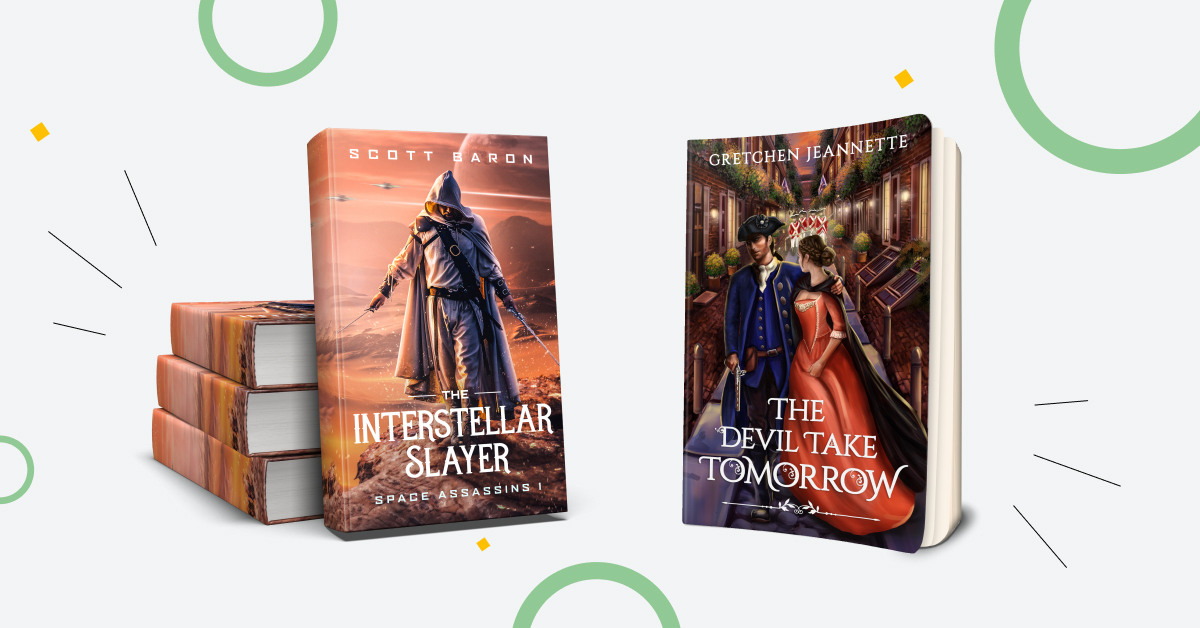Choosing whether to pick a hardback or a paperback cover is a crucial task for self-published authors.
What are the pros and cons of each option? Do my genre and target audience matter? With industry trends and market preferences constantly changing, these are the questions that keep popping up on the indie authors arena.
The truth is, hardback and paperback covers might be confusing, to say the least. There are many things to evaluate and keep in mind before making a final choice.
Therefore, to help you out, we’ve decided to put together:
- a brief description of hardback and paperback covers;
- the list of pros and cons for each option;
- and some stunning paperback and hardback design inspirations;
Let’s get down to nuts and bolts.
Hardback cover design tips
As you might have already guessed, a hardcover book is the one wrapped in thick heavy protective cardboard (2.5mm – 3.5mm thick). The spine is carefully stitched together and doesn’t change the shape. Hence the book lays down flat when opened. Based on these two facts, it’s important to know in advance if you’re going to go with a hardback or paperback option. Why?
- The book cover design process and concepts might change depending on whether you’ve chosen a hardback or a paperback cover for your book. The designer should know what they’re working on, if they can put additional design elements on the spine, and how much of the “workplace” on the front cover they’ll have.
- A similar rule applies to the interior book design. Hardcovers typically use more extensive text, so the readability and the number of pages differ. Moreover, if your book includes additional images inside, for example illustrated maps, you might want to go with a hardcover. Otherwise you risk compromising the book’s interior design.
- Another thing to keep in mind is the genre. There’s an unspoken rule that business books, cookbooks, and fiction-first/special/limited editions should come in hardcover. The reason is simple: they don’t wear off easily and quickly.
- Hardcovers can also be presented as a gift or precious element to the private collection. That’s why many bestselling authors start with the hardcover edition, whereas beginner authors lean more towards the paperbacks.
- Based on self-published authors’ profit expectations, you will most probably release the fiction books first in a hardcover edition (also great for marketing campaigns). And then, if they met the quota expectations, shift to paperbacks for mass-market production. But that might not be your case, based on the target audience research.
- The target audience is the main factor that indicates whether you should go with hardcover or paperback. As simple as it is, there are two things to keep in mind: weight and durability. If your book is meant to be read and purchased in the airport shop before boarding a plane, you obviously should go with a paperback. If your story is more of a one-time-read (romance, chick-lit, YA), the reader will not care too much about the long-term situation. So you just as well might save yourself the trouble and go with a paperback cover.
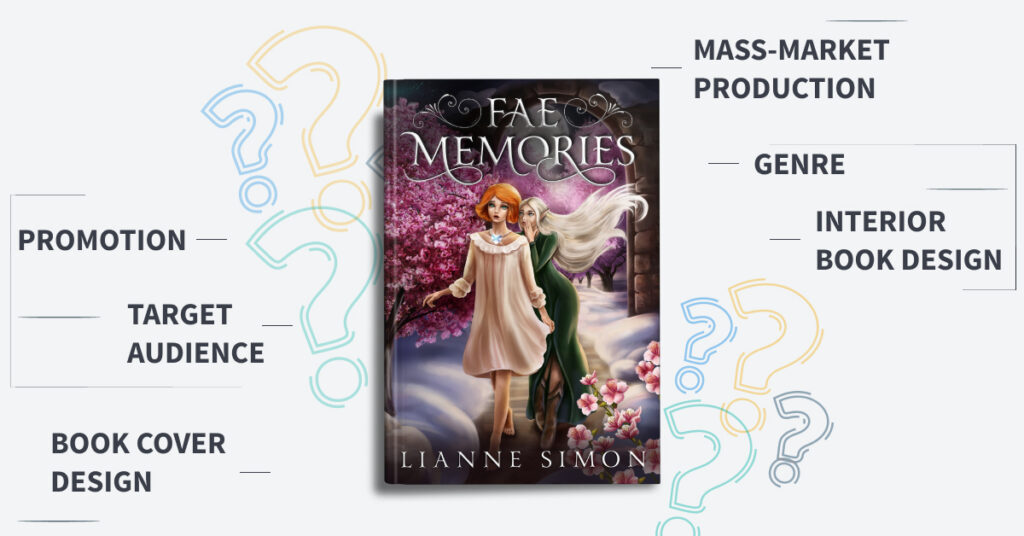
That being said, let’s take a closer look at the pros and cons of a hardcover book.
Hardback cover pros and cons
Enough empty words. We’re going to go through the list of advantages and disadvantages of choosing a hardback cover for your next bestseller. Buckle up.
Hardback cover pros
Here’s a list of why the hardback cover might be exactly what you’re looking for.
- The hardcover will last longer because of the thickness and quality of the material.
- You can also consider getting a dust jacket for your hardcover book. This allows you to experiment with the design concepts more.
- Hardcover is the go-to for pre-order links campaign. You want your readers to receive a little gift that they made for themselves. Treat them well.
- Hardcover books are more expensive. Thus increasing your profit.
- A lot of readers get hardcovers for gifts or their collections.
Now, let’s look at the other side of the coin for a minute, shall we?
Hardback cover cons
If you’re still unsure whether the hardback cover will suit your needs, see if the list of disadvantages will shed some light on the situation.
- The production price of a hardcover book is higher, and takes more time.
- Hardcovers are much bulkier and heavier, which might become a deal-breaker for some of your readers. Analyze the market wisely.
- Keep in mind that the shipping cost for the hardcover is higher than for the paper cover.
Now, it’s time for a little something extra. Check out these gorgeous hardback cover design inspirations.
Hardback cover design inspirations
It might be challenging to stop eyeballing these hardback cover design mockups. Can you picture them on your bookshelf? We certainly can!

The playful magical book cover designed for “Of Vultures and Kings” by William Joseph piques the interest at the very first glance. The fantastic color palette is perfect for the hardcover design since you definitely don’t want the colors to faint with time.
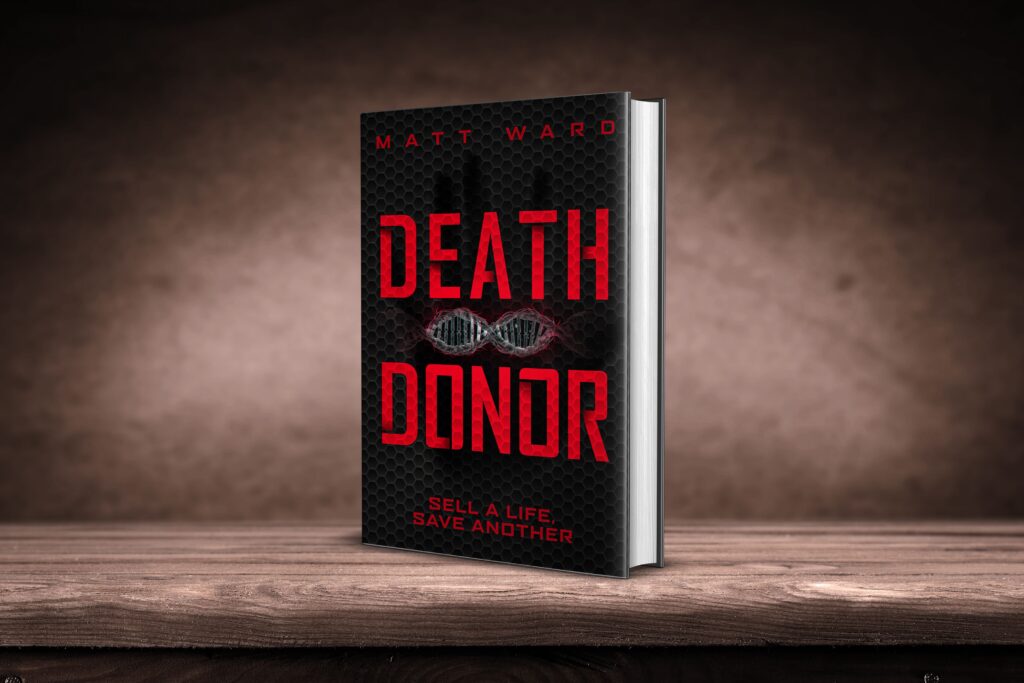
The book cover designed for “Death Donor” by Matt Ward deserves a special place in your thriller collection. Matt Ward is the best-selling science fiction and fantasy author, and the #24 ranked futurist worldwide. This is exactly the case when readers can’t wait for the book to get released to start discovering a new dystopian world. Hardback cover design it is!
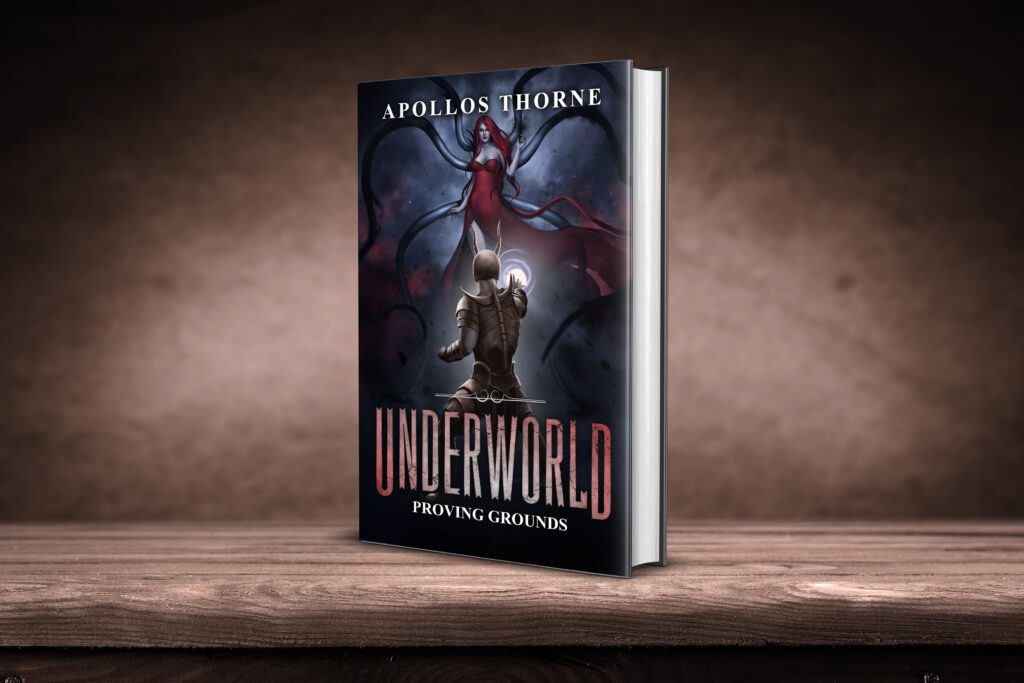
Can you take your eyes off the hardback cover designed for “Underworld” by Apollos Thorne? The author also decided to go with the dust jacket design to include more information on the front and back flaps. As we explained before, the hardback cover is your best option in this case.
It’s time to dive into the paperback cover design. On your mark, get set, go!
Paperback cover design tips
Once again, let’s start with the basics. Paperback cover books are wrapped in thin cardboard or paper. As a result, their production takes less time, effort, and cost.
- Paperback books are extremely popular among indie authors, mainly due to the reduced cost. Here’s a funny thing: sales of the paperback cover books are progressively climbing up, and currently, paperbacks are the majority of printed books sold.
- You’ll be pleased to know that paperback books suit all the genres out there. Due to the change in economic climate and competition in the fiction market, many new authors will release their books in paperback, omitting the hardcover stage. This trick helps to attract more readers with low prices. If your non-fiction book regards topics that are likely to change or receive updates (e.g., health and wellness), it’s a good idea to release it in paperback. This way the readers get to absorb current and new information quicker. Check out the data, and analyze the market before making a firm choice between the paperback or hardcover. For instance, in 2013, 51% of paperback sales were romance titles. Interesting, isn’t it?
- If you’ve chosen a hybrid publishing route, you might want to conduct more research on mass-market paperbacks. These are the books that are usually sold not only in traditional bookstores, but also in drugstores, supermarkets, or airport shops. There’s a whole concept, or should we even say genre, called the airport novel. They mainly attract the readers through strong pacing and rapid plot development rather than the written word’s elegance. Guess what works best for the airport novels? The one and only, paperback cover.
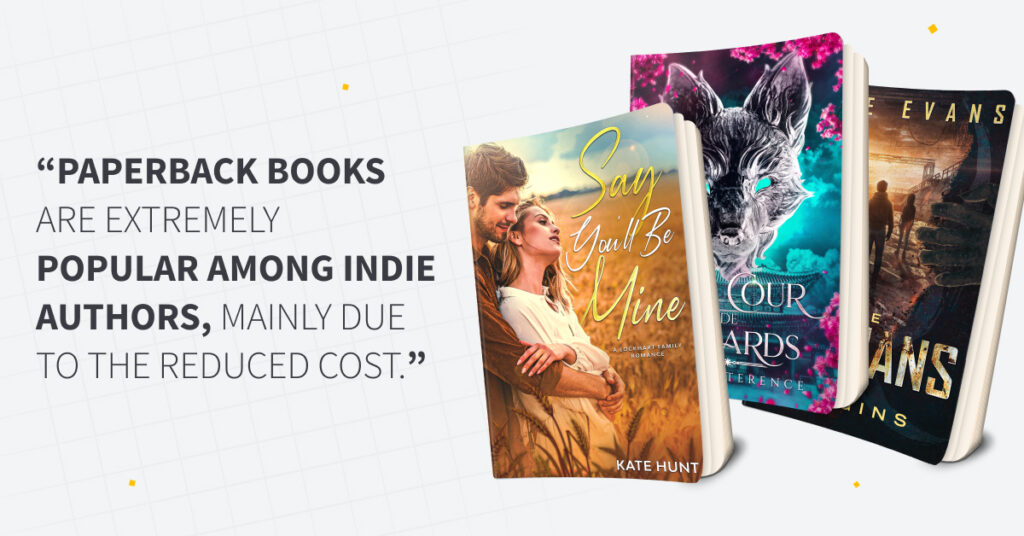
Let’s get to know better the pros and cons of the paperback cover.
Paperback cover pros and cons
It’s time for you to learn about the opportunities and obstacles that might come along with a paperback cover. Keep reading.
Paperback cover pros
Here’s everything you need to know about the advantages of choosing a paperback cover for your next book.
- Paperbacks are more portable than hardcovers.
- As an indie author, paperbacks are the most cost-effective option.
- The production of paper cover books takes much less time.
- If your target audience might get driven away by the book price, paperback covers are your obvious choice.
- Paperback books are more likely to get accepted by any bookstore or distributor.
Paperback cover cons
You might want to have a second opinion on the paperback cover if the following aspects are crucial for you.
- Paperback covers get damaged easily.
- You are risking to get less profit since you’ll be selling paper cover books for less money than the hardcover edition.
Ready for the extra bonus? Behold, the paperback cover design inspirations.
Paperback cover design inspirations
We’re proud to present you with these awesome paperback covers.
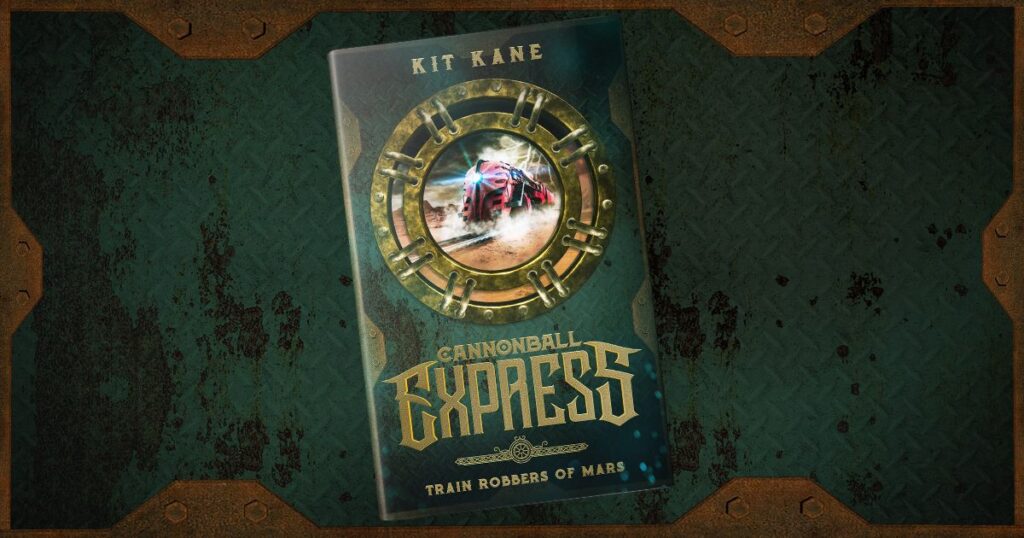
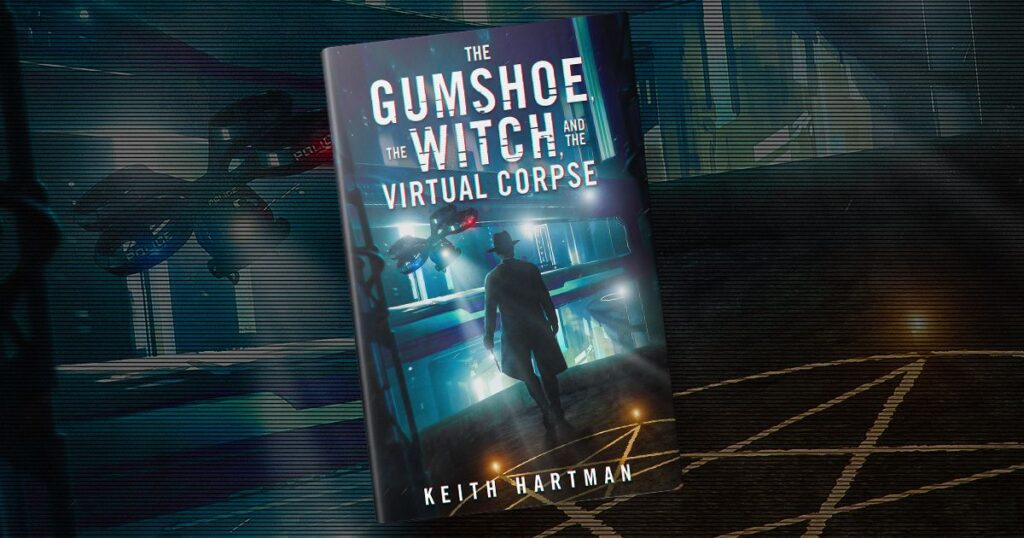
In the two examples above, you can see clear representatives of the indie author publications. The stunning book cover design and paperback edition will fit the target audience’s needs the best.

Remember how we talked about the captivating romance books? The “Isabella” is exactly the type of book you’ll grab after the “fasten your seatbelts” sign goes off.
All right, let’s wrap it all up.
Hardback vs. paperback cover: things to consider
To sum up, before making a final choice between the hardback and paperback cover, take into consideration the following:
- production time
- profit margin
- target market and audience
- book genre
- marketing activities (e.g. pre-order links, giveaways, etc.)
- book cover design
Take your time, and think carefully what your book release plan will look like and if the cover might influence it in any way.
Conclusion
We’ve reached the end of our hardback vs. paperback cover comparison. Did we manage to cast some light on the subject?
If you have any questions left, leave them in the comments section, please. We’re always here to provide more helpful information on the difference between hardback and paperback covers.

